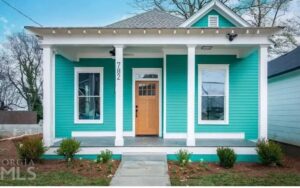Urban Oasis: Investing in Communities, One Home at a Time
As one of the largest and fastest growing metropolitan areas in the Southeast, Atlanta offers tremendous opportunities, attracting investors, corporations and young professionals looking for a place to relocate. While the historic Westside has become a prime location for real estate investment, the price of homes has soared in recent years, leaving many prospective homebuyers and long-term residents of modest economic means without options.
Urban Oasis Development is an Atlanta-based, Black-owned and for-profit housing developer committed to creating inclusive and flourishing neighborhoods, without displacing existing residents. Recognizing the increasing need for affordable housing in Atlanta, Urban Oasis invests in neglected communities by creating affordable single family housing and mixed income neighborhoods. They’ve coined their approach as, “using real estate as a community development tool”.
With Reinvestment Fund’s dual commitment to increasing affordable housing in the Southeast and supporting developers of color, investing in the vision and mission of Urban Oasis made sense. In 2019, Reinvestment Fund offered Urban Oasis a revolving line of credit for home ownership rehab. Through a unique loan package designed to offer flexibility and support for affordable housing projects, Reinvestment Fund provided Urban Oasis with its first moderate-interest construction loan as it expanded to offer mixed-income for-sale housing in the Westside of Atlanta.
“Our development approach is community-centered and focuses on people over sticks and bricks,” said Joel Dixon, Principal at Urban Oasis. “In order to provide a mix of housing across a variety of affordable price points we have benefitted from the funding flexibility and innovative housing solution approach of CDFIs like Reinvestment Fund.”
On the Westside, more than 95% of residents are Black and the median annual household income ($31,356) is less than half the median for the Atlanta region ($66,657). Urban Oasis planned to build five properties using the line of credit from Reinvestment Fund. Two of the five properties developed by Urban Oasis will be income restricted for buyers at or below 80% average median income (AMI), two will be restricted for buyers at or below 120% AMI, and one is unrestricted. The financial backing enabled Urban Oasis to renovate a two-bedroom, two-bathroom house and to construct a four-bedroom, two-bathroom house—both of which sold in 2021.
“This project is good example of how Reinvestment Fund can commit to developers by being flexible and tailoring loans to fit their projects,” said Natasha Dowell, Reinvestment Fund Lending Associate, Southeast. “The Reinvestment Fund line of credit gives Urban Oasis access to capital that is flexible and helps them to control costs, knowing they have financing to keep things moving.”

Developed by Urban Oasis development, this craftsman home overlooks the Atlanta city skyline. Photo from https://urbanoasisdevelopment.com/
Affordable housing development firms led by people of color—both nonprofit and for-profit—are highly underrepresented in the housing industry. Many lack access to the capital and resources necessary to advance much-needed affordable housing projects to build-up their communities. Community development financial institutions like Reinvestment Fund play a critical role as reliable capital partners, particularly for smaller-scale developers who are most impacted when banks pull back on lending. In times of economic uncertainty, flexible capital can be difficult to access as conventional credit sources tighten their requirements.
To confront the systemic barriers that have kept developers of color behind many of their white peers and limited the ability of communities of color to thrive, in June 2022 the Wells Fargo Foundation launched Growing Diverse Housing Developers (GDHD). GDHD is a $40 million four-year initiative led by four Community Development Financial Institutions (CDFIs), Capital Impact Partners, LIIF, Raza Development Fund and Reinvestment Fund, to expand the growth and success of 39 accomplished real estate developers of color nationwide. Working together, they are providing enterprise-level grants, which will be used to build and scale the businesses’ infrastructure, including hiring staff, upgrading technology, renting office space, and taking actions to increase access to industry connections and resources.
As a part of the initiative, Capital Impact Partners joined forces with LIIF and Reinvestment Fund to create a national learning cohort of 27 housing developers based in metropolitan regions, including Urban Oasis. The developers will have access to capital and resources to advance their development pipelines and grow their business, including capacity-building grants funded by Wells Fargo, and more than $100 million in additional funding the CDFIs have committed toward innovative loan products. Ultimately, the initiative plans to create a more inclusive housing ecosystem where communities have access to more affordable options for renters and homeowners while supporting the sustained growth and financial success of experienced housing development firms led by people of color.
Through the GDHD initiative, Reinvestment Fund hopes to amplify the impact underrepresented housing developers are already achieving in advancing affordable housing in communities facing displacement pressure. When CDFIs invest in developers of color, the impact often expands beyond the project and has a multiplying effect that can extend to hiring other people of color, resource sharing, and wealth-building within the community. Reinvestment Fund’s partnership with Urban Oasis Development is a testament to what BIPOC housing developers can achieve when CDFIs recognize both the systemic barriers in place and the overall community benefit of investing in innovative projects through flexible capital and capacity-building resources.
You can read other examples of how Reinvestment Fund is forging partnerships to address affordable housing in the article, “Small But Mighty: How Small-Scale Developers Are Reimagining Atlanta’s Affordable Housing Playbook” featured in the Saporta Report.
Originally published in the Saporta Report, January 19, 2023